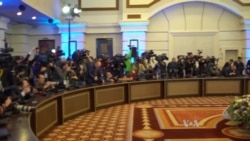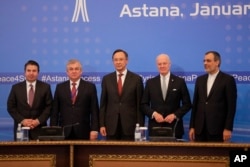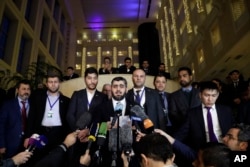Russia, Turkey and Iran have agreed on a plan to support the partial Syrian cease-fire and find a political solution to the six-year conflict.
No details were immediately released, although the statement said the sides should meet again next month in Geneva. Members of the Syrian opposition groups at the talks expressed doubts about the trilateral mechanism to ensure compliance with the cease-fire.
"We are always skeptical about such countries," said Issam Alrayyes, spokesman for the Free Syria Army's Southern Front. "I mean, mainly Iran. For sure Russia. But we hope this time that Russia is taking a different role."
Syrian opposition delegation leader Muhammad Alloush gave Russia a proposal for a comprehensive truce and said he expects an answer within a week.
Watch: Russia, Turkey, Iran to Monitor Syria Truce; Rebels Skeptical
Syrian government support
The Syrian government, backed by Russia and Iran, welcomed the trilateral plan, but made clear the government will push ahead with a military offensive against rebels just outside Damascus.
"So, the issue here is not about who is happy and who is not happy," said Bashar al-Jaafari, the Syrian government's negotiator and ambassador to the United Nations. "The issue is that, finally, we have a consensus called final communique, or final declaration, agreed upon by everybody."
The rebel delegation, largely backed by Turkey, refused direct talks with the Syrian government, deflating hopes for a breakthrough. Some rebel groups, weren't even invited — seen as being too linked to jihadist organizations.
United Nations special envoy Staffan de Mistura says with so many parties fighting in Syria, including extremists, finding progress between the government and rebels is difficult.
"Expecting the international community to actually come up with a miracle in a context like this and a divided Security Council is actually a little bit unfair to call a failure," he said. "But, rather, quite a challenge."
The two sides met at the opening of the Astana talks on Monday, but exchanged no words and sat at opposite ends of a massive round table. After the opening ceremony, they communicated only through intermediaries who shuttled between their separate rooms.
Both sides this week have accused the other of cease-fire violations. The truce, brokered by Russia, Iran and Turkey, last month has been repeatedly marred by fighting. The cease-fire also didn't cover the entire country, and the Damascus government said it will continue attacks against what it called terrorist groups — mainly those allied with al-Qaida.
Astana or Geneva?
"There's an element of theatrics to it," said Noah Bonsey, the International Crisis Group's senior analyst on Syria. "I think, insofar as there has been real substantive discussion here in Astana, it's been between the Turkish, Iranian and Russian delegations. We don't know the full content of those discussions, we don't know how much they really got into what would be required to enforce the cease-fire on the ground, to make it truly national, to cover more of the country, to be better observed by both sides."
The Astana talks on Syria were the first such talks brokered by Russia, Turkey and Iran. Some analysts say concerns that the Astana peace effort could overtake the more prominent negotiations in Geneva are overblown.
"Did we just witness here in Kazakhstan the beginning of a new diplomatic platform distinct from that of Geneva, or will this simply be an introduction to sort of energize Geneva talks, or something in between? I think the in-between is more likely," Bonsey said.
Kazakhstan hosted Syrian opposition talks in 2015 and the U.N. sponsored several rounds of negotiations that included the United States and produced short-lived cease-fires. Russia and Turkey invited the U.S. to the Astana talks, but the State Department said President Donald Trump's administration was too busy with the transition to take part.
Instead, the U.S. ambassador in Kazakhstan attended as an observer.
Rebels at Astana say they will not attend the next meeting in Geneva, expected February 8, if the current cease-fire fails to hold.








